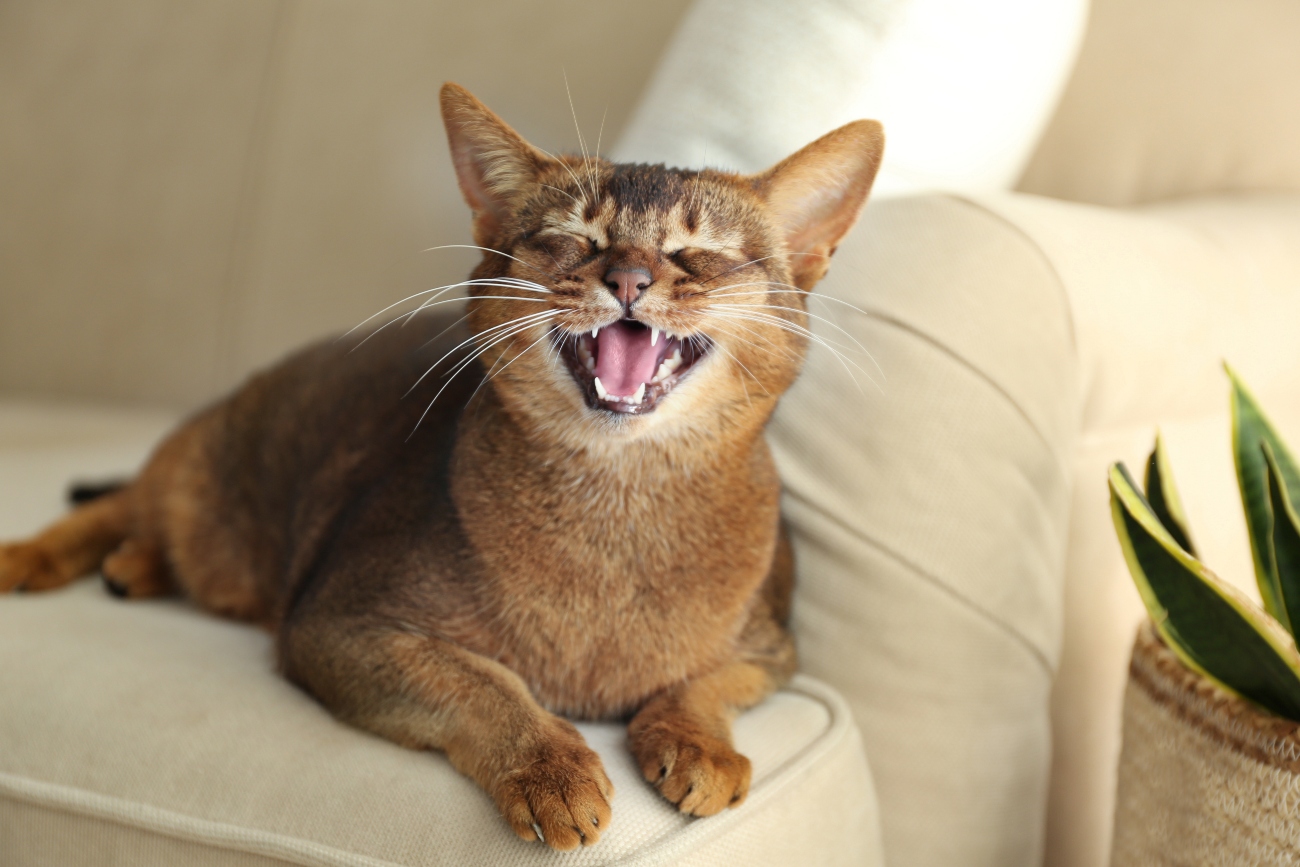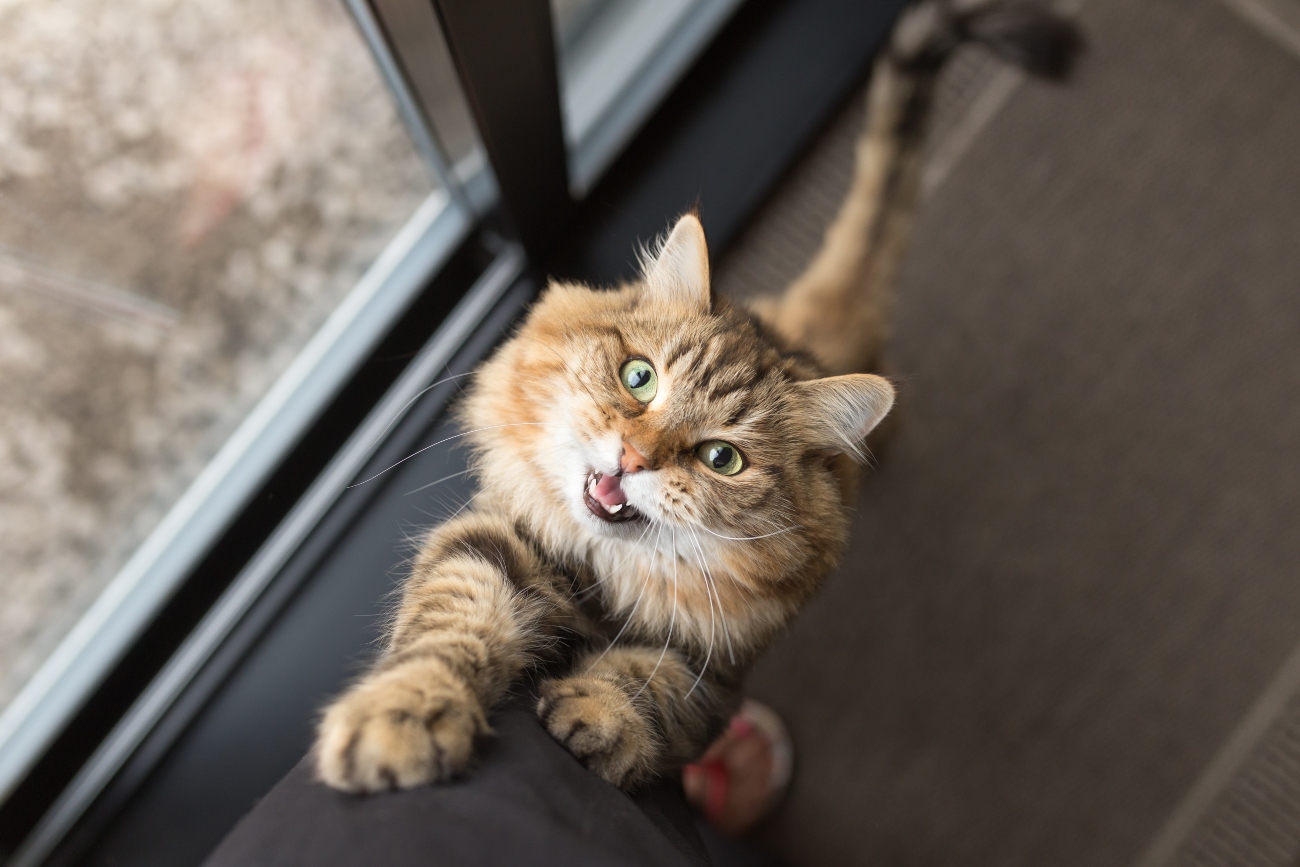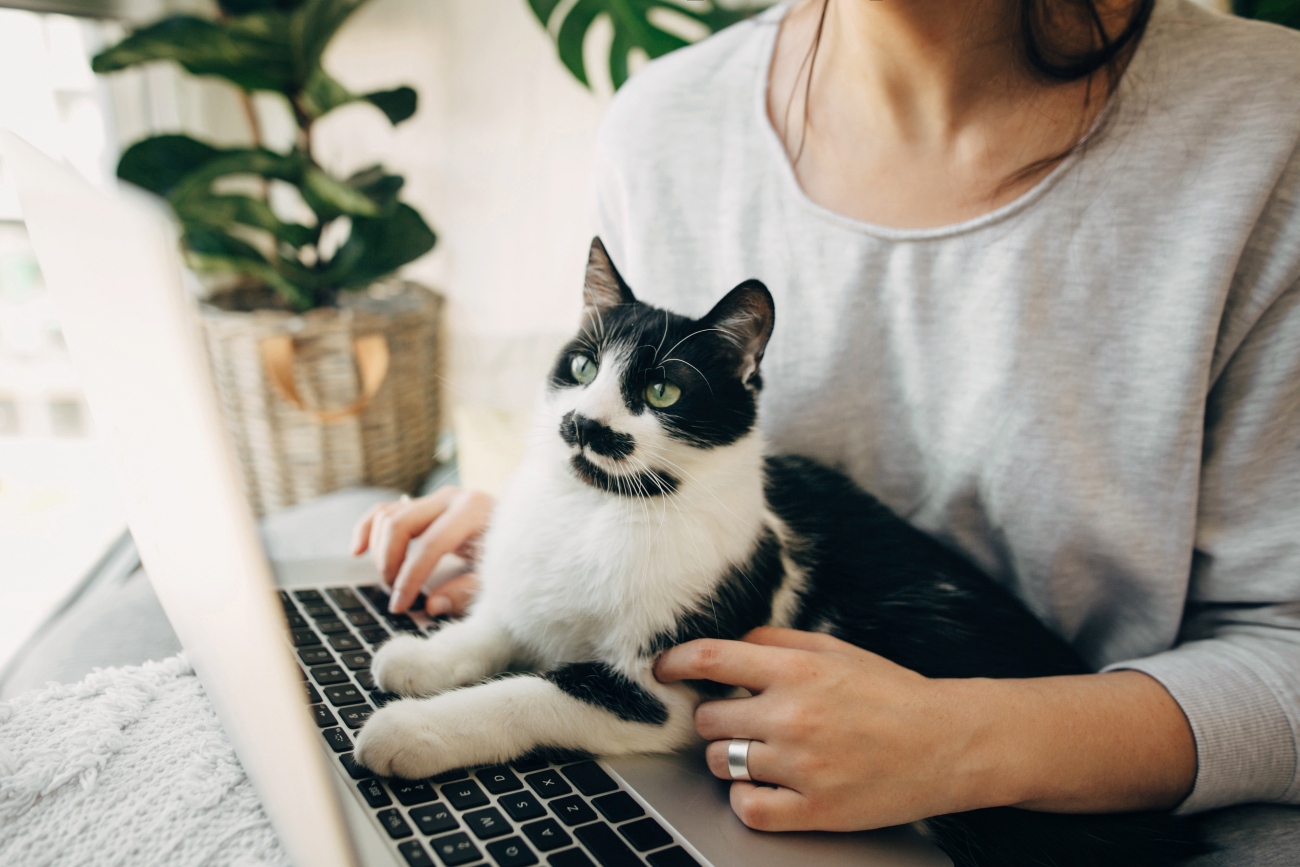
Why is my cat meowing so much?
2nd May, 2023
Is your cat’s constant meowing driving you up the wall? They’re probably trying to communicate with you, and we’re here to tell you what it could mean.
That soft, peaceful purr is a comforting sound when curled up with your cat on the sofa, but the same can’t be said for their distinctive meow!
When your feline friend starts wailing non-stop, it can really start to get on your nerves. Don’t worry, many mog parents have been there. You may just have a particularly vocal breed on your hands, but your pet might actually be trying to tell you something, too.
Are they hungry?
Feeling lonely?
Injured?
There's a host of reasons why cats meow excessively, and we’re sure you want to know why.
We’ll take a closer look at why your feline can’t be quiet and what all those different sounds they make actually mean.
You’ll also learn why senior cat insurance is a must to protect their health as they age – because your faithful feline friend deserves only the very best.
11 cat noises and their meaning
When you think of cat noises, what comes to mind? A mighty meow? Pleasant purr? Cheery chirp? Your feisty feline communicates using a host of sounds that all mean different things.
So, what’s your dear mog trying to tell you? Let’s find out!
The classic meow
Whether someone loves cats as much as we do or not, they’re bound to recognise the standard version of the meow. This classic sound is mid-pitch and mid-length, and it usually means your pet wants something.
The not-so-easy part? It’s not always obvious what they’re after, so it’s your job to use the context to figure it out.
The short meow (or ‘mewl’)
This happy, shorter meow usually means your cat is pleased to see you, and they’ll often accompany the vocalisation by rubbing against your legs. Is there a better way to be greeted when you come in from work? We don’t think so!
The long meooooow
Who needs an alarm when you’ve got a cat? Many felines wake their pet parents up bright and early when they’re hungry for breakfast. The noise is usually long, drawn out and almost sounds like a bit of a whine.
While it can be a little annoying on those Sunday mornings you ‘hoped’ for a lie in, your cat is asking for help. You might also hear the long meow before dinnertime or when it wants to be let out.
Low-pitched meow
When your feline is becoming a little agitated, you might hear this low grumble. Instead of needing attention, they’re now frustrated, and you may well hear it when it’s past breakfast and you still haven’t got out of bed.
High-pitched meow
A quick, soprano version is more like a yelp for help, which could mean something startled your mog or it’s been hurt. Make sure you cover your pet with senior cat insurance to get emergency care if it needs to see the vet.
Non-stop meowing
When your cat meows again, and again, and again, it’s probably excited about something! It’s often the smell of tuna when you open a can and it’s longing after a titbit or two.
Purr
Perhaps a cat owner's favourite sound, the soft purr usually means they’re as content as can be, whether that’s curled up in your arms or in their favourite spot on a sunny windowsill.
Cats Protection warns you to be careful, though – this peaceful noise doesn’t always mean everything’s perfect in your feline’s world. Occasionally cats purr to self soothe or as a cry for help, which could mean they’re physically hurting or feeling a little blue.
If you can’t see a reason why your mog might be content, it’s a good idea to give your vet a call. Got senior cat insurance with Petwise? Speak to a qualified vet via our 24/7 video consultation service for quick, professional advice.
Caterwauling
There’s no sound quite as disturbing in the middle of the night than a loud howl from a cat – this noise isn’t meant for you to hear, after all. So, what is it then?
When female cats are in heat, they wail like this while on the lookout for a mate, so get your cat spayed if she isn’t already to prevent this late night racket.
Neutering your pet has a host of other benefits, too, like eliminating the risk of a few serious health concerns and the chance of a surprise litter to look after. Pregnancy also comes with a variety of possible complications for your feline, which may not be covered by senior cat insurance.
Males can howl, too, and for a variety of reasons – like if they’re getting wound up, bored or about to fight with another neighbourhood feline.
Hissing
When you hear a hiss from your pet, they’re most likely frightened or angry because another animal has entered their territory. Your feisty feline is telling them to go away – which they may or may not do – so keep an eye out in case you need to take action before a fight breaks out!
Is your cat hissing but there’s no other animal in sight? They might be in pain and need you to take them to the vet. Don’t worry, our specialist senior cat insurance may be able to help pay towards emergency treatment.
Chattering and chirping

This jolly sounding noise is hard to describe – it sounds a little like a quick, high-pitched bleat or stuttered meow. When you hear it, you’ll know what we mean! But why do cats do it?
This is also a bit of a grey area, but many feline fans believe it has something to do with hunting instincts, as they often hear it while their pet is watching or stalking birds and other prey (including their favourite fishing toy).
It might be an attempt to mimic a birds’ sound and lure them into a false sense of security or it could just signal frustration as they watch prey from behind a window, unable to actually catch it.
It might even be an expression of excitement before the thrill of the chase!
Growl
It may not sound as mighty as their big cat relatives, but your mischievous mog can also growl. Just like when your dog snarls its teeth at another canine, your cat is telling an enemy to back off – this could be you if you try to take their bowl away before they’ve finished eating!
Why does my cat walk around crying?
So, felines often change a little as they age (find out how in our article on recognising behaviours and changes in an ageing cat). But excessive, non-stop meowing could be their way of trying to tell you something’s wrong.
Here are some of the most likely causes of increased vocalisation:
- Stress: Recently moved home or got a new pet? Something might be stressing your cat, causing a meow manifestation! Give them some attention and find the source of their anxiety. Your vet should be able to give you advice to help them relax.
- Loneliness: If you’ve had a busy week and aren’t giving your cat as much attention as usual, they might start a noisy protest. Only reward them with a stroke once they quieten down but stop if they start vocalising again.
- Possible illness: Constant meowing could be your pet trying to tell you they’re not feeling so good. This could be something as simple as a minor cut on their paw or a serious health issue like kidney disease. A visit to the vets will soon tell you if this is the cause.
- DNA: Noisiness isn’t always cause for alarm. Certain breeds, like Siamese cats, are renowned for their ability to chat for hours, so constant meowing could just be down to their genetic makeup.
- Hunger: Some felines love making a fuss when it’s close to tea time and meow constantly until you fill their bowl. You might be able to train them to quieten down by only feeding them when they stop meowing.
Whenever you notice your elderly feline becoming more vocal (whether or not you think it’s something serious), it’s best to take them to the vet for a check-up. Tell them about any other behavioural changes you’ve noticed, and they’ll be able to check whether there’s an underlying cause for their noisiness or not.
Regular vet visits are a must when you own an older mog. Routine check-ups aren’t included on your senior cat insurance, but they can spot various medical concerns before they become too serious.
If further care and treatment is needed, your Petwise policy can help cover you financially.
Should I ignore my cat’s meowing?
It depends. First, you’ll need to make sure your pet isn’t meowing because there’s a problem. The last thing you want is to miss a sign that your faithful feline is unwell because you didn’t pay attention to their sounds. Your vet will be able to rule out any illnesses.
Once you know they’re simply vocalising because they want some attention or is feeling a little put out, you can start working towards a more peaceful existence together. How? We’ve got some tips below.
How can I get my cat to stop meowing?
You’ve worked out why your feline friend has been more vocal recently but everyone in the house would prefer it if it went back to its quiet and peaceful ways. Are we right?
Depending on the cause, there are a few things you can do to help your elderly pet curb its love for meowing.
Stress due to disruption
Cats love routine. Stability and predictability make them feel relaxed and like everything is right in feline world. So, when something major upsets this rhythm, their first reaction to the stress is to let you know by shouting it to the rooftops.
A lot can create such feelings in your mog, like moving home, having a baby and even simply rearranging the living room! What can you do to help?
- Focus on consistency and stability wherever you can. This could be making sure their bed is set up after a move and sticking to your usual feeding times no matter what the disruption is.
- Get them a new addition or two to their toy box and provide plenty of fuss to take their mind off of things.
Meowing at night
There’s not a lot more frustrating than being woken suddenly from a deep slumber by your noisy cat. As they age, felines sometimes become more active during twilight, much to their owner’s dismay.
Luckily, there are a few ways you can encourage them to give you some peace:
- Ignore their calls for attention. Some owners can’t resist getting up and giving in to cries for food. Even a quick shoo out of the bedroom gives them that attention they crave, so don’t give in!
- Tire your cat out before you hit the hay by playing early in the evening.
- Don’t let your feline loose around your home. Instead, keep them in one part of the house where they have access to their litter tray, water, bed and toys.
- Keep them awake as much as possible during the day. Provide stimulating toys, pop something on TV and ask a neighbour, friend or family member to check in for some playtime.
Attention seeking
The best and only way to nip this in the bud is to ignore it completely. Don’t even tell them off or it might reinforce their behaviour.
Once your cat settles down, give them some fuss. This way they knows they’ll only get a stroke once they’re quiet.
Pet insurance specialists you can trust

Your beloved mog has been a faithful friend for years, so why not reciprocate their unconditional love with senior cat insurance from the specialists?
There’s no upper age limit to our pet insurance plans and dental cover comes as standard.